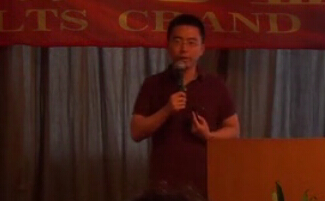雅思写作中易失分的语法
2012-10-23 00:00 供稿单位: 互联网
出国英语考试有哪些 雅思6.5是什么水平 雅思阅读评分标准 托福阅读评分标准 雅思和托福的区别
在雅思写作中,我们要时刻记住要按照英式思维和习惯去写,在此基础上才能尽情的发挥。雅思写作不仅考察了同学们的英语写作能力,而且很多细节语法只是的掌握程度也很能在雅思写作中体现出来,而在雅思写作中失分点的地方不在难的语法,反而都是在基础的语法上失分的。这也说明了考生们是有多轻敌。来看一下这些易失分的基础语法吧,吸取教训,避免犯此类的错误。
一、such as与for example的混用
我们知道,在表示举例子的时候,such as与like是完全等同的,如:Wild flowers such as/like orchids and primroses are becoming rare。
但是同学们对于Such as、for example 的把握还是不够准确。我们都知道,后者接句子前者接词语表示举例子。于是就有了下面的写法:
There is a similar word in many languages, such as in French and Italian。
这里的such as改为for example为好,因为“in French and Italian”其实是“there is a similar word in French and Italian”的简化,所以要用for example来引出例证。再来看几个类似的例子:
It is possible to combine computer science with other subjects, for example physics。
二、assume 及claim 使用不够准确
我们知道, think,assume,claim是议论文中常用引出观点的动词。在实际作文中,同学们往往认为几个词的意思是一样的,完全可以代换,所以拿过来就用。甚至还有同学把consider也拿过来与之混用。我们首先还是从定义来看这几个词的不同:
Think: to have opinion or belief about sth。
翻译为“认为”,通常接宾语从句来表达比较确定的观点。
Assume: to think or accept that sth is true but without having proof of it。
翻译为“假设、假定”,是否有事实依据是不确定的。
Claim: to say sth is true although it has not been proved and other people may not believe it。
翻译为“声称”,用这个词往往意味着不赞同紧跟其后的观点,所以很少用作‘I claim that…
Scientist are claiming a breakthrough in the fight against cancer, but in fact, …。
所以‘It is claimed that’通常翻译为“有报道称。。。”。和‘it is reported that ’的区别在于后者翻译为“据报道”,往往代表着作者赞同报告的内容,
Consider: to think about sth carefully, especially in order to make a decision
翻译为“考虑”,一般不用作引出观点,看个例子:
We are considering buying a new car。
所以,千万不要在雅思大作文的段(观点表达段)就因为用词把握不准而导致对整篇文章的低分印象。
三、介词使用错误
1、普通介词的误用
一般表现为固定搭配错误,如常把provide sb with sth用成provide sb sth; be satisfied with用成be satisfied for等等,虽然这样的错误看似无伤大雅,但在考官眼里就是影响顺畅阅读的,当然会影响最终成绩。解决的办法简单而古老:把常见的固定搭配牢记于心,问题 自然就解决了。
2、 “to”作为介词的误用
“to”最常见的用法是以动词不定式符号的形式出现的,所以同学们也已经习惯了“to do”的固定搭配。对于一些如walk to me, to the left等介词to表方向等常见用法一般也不会出现错误。但是对于与动词搭配的介词to就会经常犯错:
如:
More and more students have taken to depend on their parents to make decision for them。
这里的‘take to’ means ‘to begin to do sth as a habit’其中‘to’为介词,所以后面只能接名词或相当于名词的词,如动名词。所以句中depend on 应改为“depending on”。“take to”的另一个常用用法也需要牢记:
He hasn’t taken to his new school. (这里‘take to’ means ‘to start liking sb or sth’)
Prefer A to B中的“to”也是介词,会有prefer doing sth to doing sth/ prefer sth to sth else,另外,“prefer to do sth rather than do sth”中的“to”可是真正的不定式符号。
类似的常用用法请同学们牢记:
Be used to doing
Adapt to doing
Adjust to doing
prefer doing sth. to doing sth。
Be accustomed to doing
See to doing
等等,请注意平时仔细积累。
四、表“建议”的词汇后面忘记用虚拟从句
这是摘自学生雅思作文中的一个病句:
I suggest he continues his study instead of working after graduation from high school。
因为‘suggest’翻译为“建议”,所以后面的从句应该用虚拟语气,句中“continues”部分应该改为“(should) continue”。
在此,小编提醒您,一定要牢记以下常见表“建议”的词汇,而且要记住这些词接从句时要用虚拟语气:
Recommend, suggest, advise
五、compare与contrast的误用
我们先从两者的定义入手来看两者的区别。 Compare的定义为:to examine people or things to see how they are similar or different. Contrast的定义为:to compare two or more things to show the difference between them。由定义不难看出前者侧重于找到两个或多个事物的异同,而后者则侧重于它们的不同。
看个例句:
It is interesting to compare their situations to ours./It is interesting to contrast their situations to ours。
前一句翻译为:对比一下我们的情况与他们的情况会很有趣。
后一句的翻译为:我们的情况与他们的情况有很大的不同,这很有趣。
再看一个引自OXFORD ADBANCED LEARNER’S DICTIONARY的例子:
There is an obvious contrast between the culture of East and West。
The company lost $7 million in contrast to a profit of $6.2 million a year earlier。
When you look at their new system, ours seems very old-fashioned by contrast。
不难发现,Compare翻译为“与。。。相比”而contrast可译为“明显不同的是。。。”,切记这种翻译方式就不会用错彼此了。
新航道国际教育集团提供专业的雅思培训、托福培训、GRE培训、SAT培训、剑桥青少英语培训等,为广大学子“开启英语成功之道”
- 上一篇:雅思写作范文:电视新闻
- 下一篇:是什么拖住了你的写作速度?

- 新航道,英语成功之道。时间获取新航道英语学习资料和新鲜资讯,请在微信公众账号中搜索「新航道英语」或者「xhdenglish」,或用手机扫描左方二维码,即可获得新航道每日精华内容推送和英语学习经验分享,并参与新航道举办的各项活动。
图文资讯:
精彩专题
更多视频荟萃
更多
-
新航道姚骏鹏-雅思阅读高分攻略
时长:03-06

-
新航道陈侃侃-雅思口语要有范儿
时长:03-06

-
【3分钟学雅思】王大锤告诉你为啥药不能停
时长:01-12

-
【3分钟学雅思】全世界个感官餐厅
时长:01-12
热门文章
更多
-
8月31日雅思广州考机考初体验
选择机考模式的考生将通过机考模式参加听...








